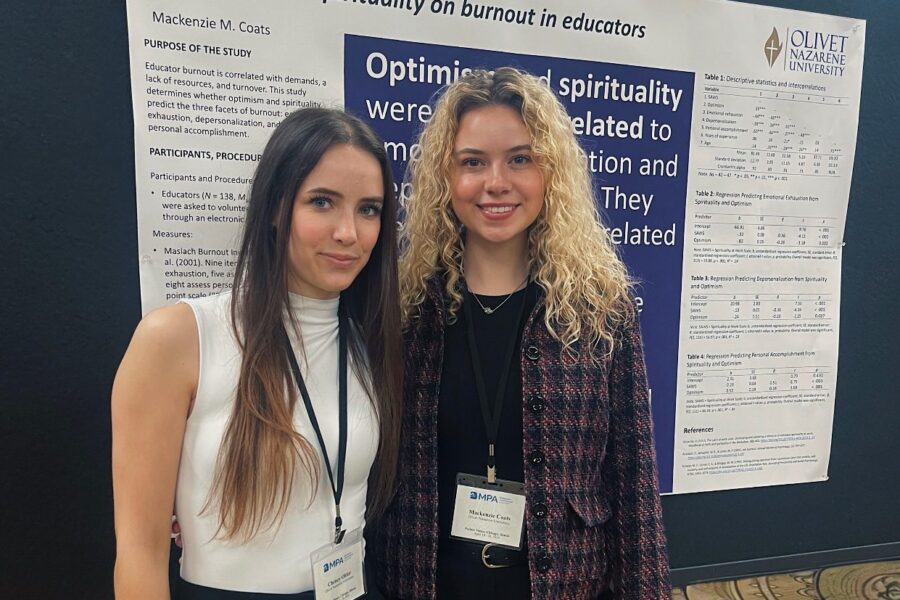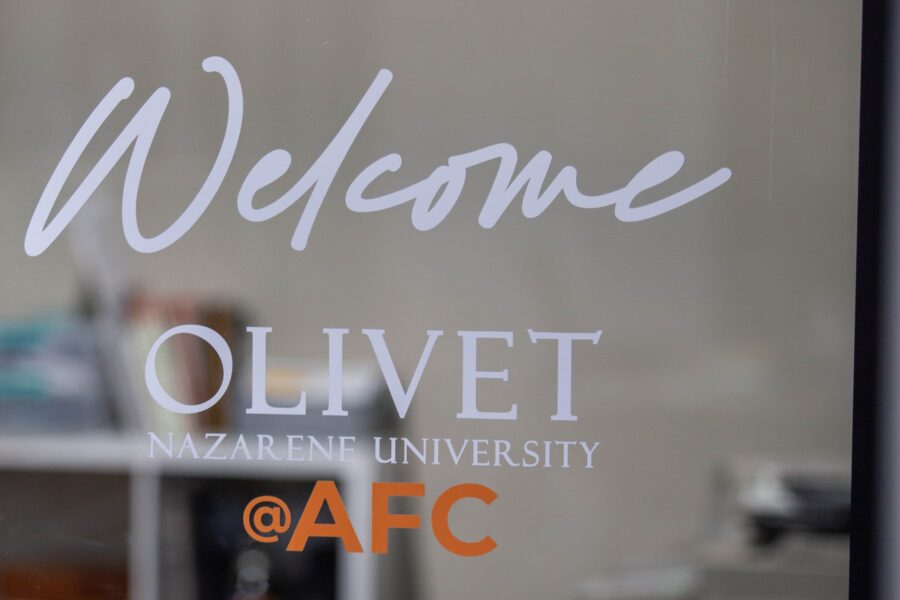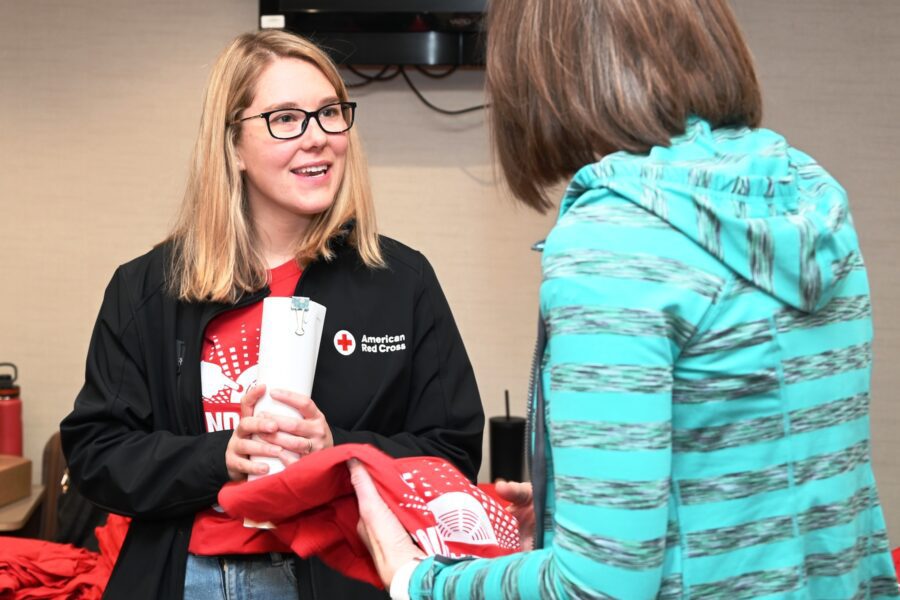
“It’s not what you know. It’s whom you know.” This common phrase rolls easily off the tongue and illustrates well the importance of networking. However, it often minimizes the immense impact that knowledge can have on successful outcomes.
The Honors Program at Olivet Nazarene University is structured in such a way to provide high-level academic opportunities supported by the collaboration, wisdom and mentorship of subject-matter-expert faculty members as well as the comradery of an intentional cohort of classmates. Ultimately, students graduate with equal measures of relational and educational experiences.
The Honors Program consists of four semesters of team-taught, discussion-based courses that satisfy four of Olivet’s general education curriculum requirements. The following two years, students complete advanced research projects under faculty guidance.
Mackenzie Coats ’23 and Cheney Ohler ’23 met in the freshman year Honors Program course and became fast friends. Mackenzie, a California native who was recruited to play volleyball at Olivet, majored in business administration with concentrations in health care and human resources. Cheney, from Illinois, studied psychology and sociology. The women bonded over a shared interest in the Honors Program curriculum, the field of psychology and investment club.
“I enjoyed the classes and the people,” Mackenzie says. “Honors was a place to come have philosophical and applicable discussions about what we were learning. We had tough but relevant conversations — particularly about concepts like peace and shalom, tech and AI, and racial systems running through the world today.”
For Cheney, the program stretched her personally. She valued the opportunity to connect with peers and professors.
“The Honors Program is a collaboration, even in early years,” Cheney says of her experience. “The environment was challenging, rewarding and entertaining. It was also cool to be connected to people in so many different majors. I am naturally shy, but in those Honors class environments, it was easy to come out of my shell. I came from a rigorous high school, and the teachers were somewhat detached. So I was surprised how invested the professors were at Olivet. They really liked to hear what we had to say and encouraged differences of opinions.”
Cheney used her capstone research project to satisfy the requirements for both the Honors Program and a cumulative project in her Quantitative Research course. Her adviser for both projects, Dr. John Adams ’10, provided oversight and critical knowledge of developing surveys but allowed Cheney to steer the project as she examined the connections between attachment theories and anxiety in stepfamilies.
“I desired to learn about things that had impacted my life — how I grew up and learned to navigate the world,” Cheney reflects. “I wanted to learn about myself and other people like me who grew up in divorced relationships. In the process, I realized that there was a gap in literature.”
She received funding from both the Honors Program and the Department of Behavioral Sciences to offset the costs of administering and incentivizing surveys for students and staff at Olivet. Cheney presented her research findings at the annual Honors Day conference and the Associated Colleges of the Chicago Area conference in Chicago. The presentations were nerve-wracking, but she was prepared with well-rounded research and plenty of past presentation experiences.
“I enjoyed the research process more than I thought I would,” Cheney says. “I didn’t think I would be capable or thought research was just for people who were wired differently from me. But, through the Honors Program, I learned I have strengths in STEM and that I really enjoy research.”
Through her research project, Mackenzie examined the effects of optimism and spirituality on burnout in educators under the guidance of her mentor, Dr. Kristian Veit. She leveraged a network of teaching professionals in Olivet’s alumni database (bolstered by her father’s and brother’s careers in education) and used surveys to gauge the level of burnout among teachers. The results gave her valuable information about how to combat burnout — a resource and skillset that will prove very useful for a career in human resources.
“I think the Honors Program was extremely beneficial,” Mackenzie says. “It set me leaps and bounds ahead of my peers in terms of self-reflection and critical thinking. Freshman year, you’re in deep conversations about what it means to be human and to be alive through very personal, philosophical conversations. Then, you get really skilled in putting together annotated research papers. By the time I was writing one for my research project, I felt very capable in my skill set.”
The Honors Program research process sparked career interests for both Mackenzie and Cheney. They both graduated a semester early, giving them time and space to get a jump start in the workforce. To complete their Honors Program experience, each of them presented at the Midwest Psychological Association conference in spring 2024.
Mackenzie works as a talent acquisition specialist and anticipates earning an MBA in the near future.
“I gained a lot from the program,” Mackenzie says, “but it was especially helpful to have something tangible at the end. I am confident that looking for a job with applicable, high-level academic experience set me apart from other candidates.”
In the coming years, Cheney hopes to earn a Ph.D. in clinical psychology to open doors to a career in forensic psychology.
“I definitely recommend the Honors Program,” Cheney emphasizes. “The professors integrated concepts so well into our discussions, and I met more people than I would have normally. We all had to show up and work hard, but I got a lot out of it.”
Sidebar: To be eligible for application to the Honors Program, students must meet at least one of the following qualifications: have an ACT score of 28 (or an equivalent SAT score); graduate in the top 10 percent of their graduating class; or have an unweighted GPA of at least 3.75 on a 4.0 scale.
Caption for ELAIA cover photo: The culmination of students’ research is published in ELAIA: The Olivet Nazarene University Honors Journal. All volumes of ELAIA can be read online at issuu.com/Olivet. For more details about the Honors Program and application information, visit www.Olivet.edu/Honors.
From Olivet The Magazine, Compassion & Conviction – Spring 2024. Read the full issue here.





